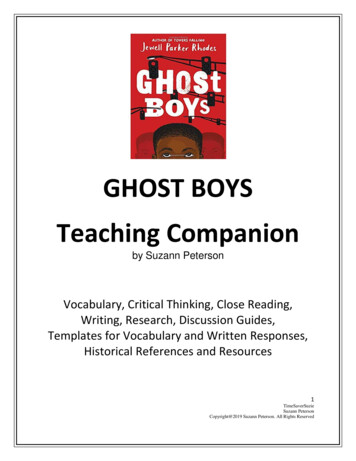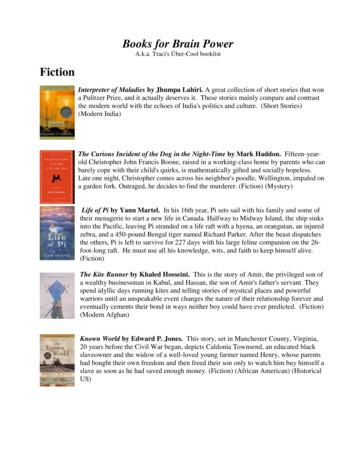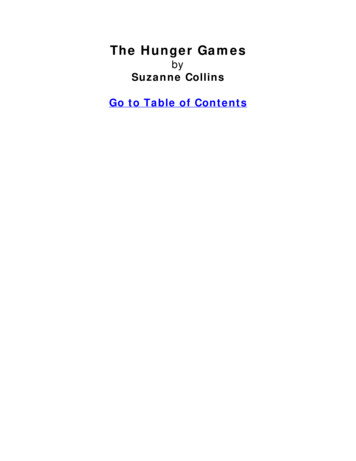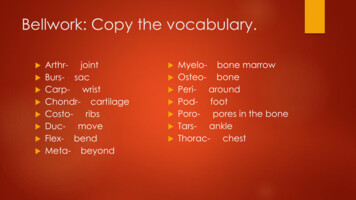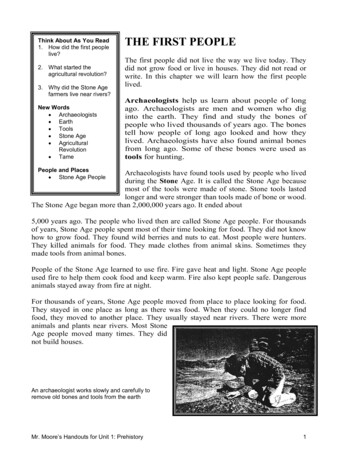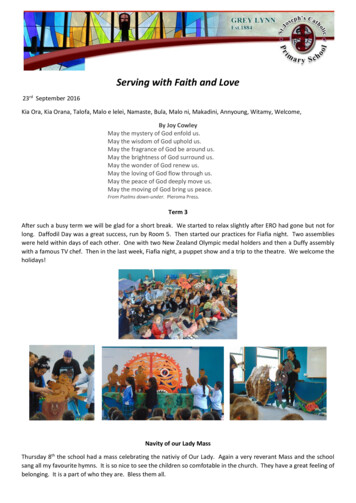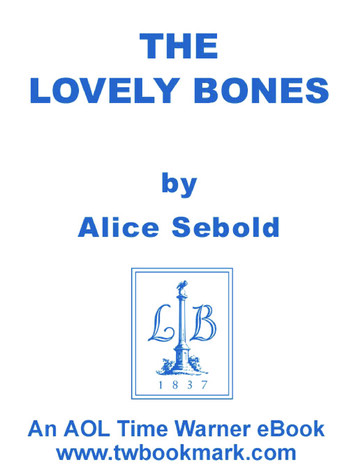
Transcription
T H EL O V E L YB O N E S
ALSO BY ALICE SEBOLDLucky
T H EL O V E L YB O N E Sa novelAlice SeboldLITTLE,BROWNBNEOSTONWANDYO RKCOMPANYLONDON
Copyright 2002 by Alice SeboldAll rights reserved. No part of this book may be reproduced inany form or by any electronic or mechanical means, includinginformation storage and retrieval systems, without permission inwriting from the publisher, except by a reviewer who may quotebrief passages in a review.The characters and events in this book are fictitious. Any similarity to real persons, living or dead, is coincidental and notintended by the author.Book design by Jo Anne MetschLittle, Brown and Company1271 Avenue of the AmericasNew York, NY 10020An AOL Time Warner CompanyFirst eBook Edition: October 2002ISBN: 0-7595-9802-9Visit our web site at www.twbookmark.com.AOL Keyword: Lovely Bones
Always, Glen
T H EL O V E L YB O N E S
Inside the snow globe on my father’s desk, there wasa penguin wearing a red-and-white-striped scarf.When I was little my father would pull me into his lapand reach for the snow globe. He would turn it over,letting all the snow collect on the top, then quicklyinvert it. The two of us watched the snow fall gentlyaround the penguin. The penguin was alone in there,I thought, and I worried for him. When I told myfather this, he said, “Don’t worry, Susie; he has a nicelife. He’s trapped in a perfect world.”
O N EMy name was Salmon, like the fish; first name, Susie.I was fourteen when I was murdered on December 6, 1973. Innewspaper photos of missing girls from the seventies, mostlooked like me: white girls with mousy brown hair. This was before kids of all races and genders started appearing on milk cartons or in the daily mail. It was still back when people believedthings like that didn’t happen.In my junior high yearbook I had a quote from a Spanish poetmy sister had turned me on to, Juan Ramón Jiménez. It went likethis: “If they give you ruled paper, write the other way.” I chose itboth because it expressed my contempt for my structured surroundings à la the classroom and because, not being some dopeyquote from a rock group, I thought it marked me as literary. I wasa member of the Chess Club and Chem Club and burned everything I tried to make in Mrs. Delminico’s home ec class. My favorite teacher was Mr. Botte, who taught biology and liked to
Alice Seboldanimate the frogs and crawfish we had to dissect by making themdance in their waxed pans.I wasn’t killed by Mr. Botte, by the way. Don’t think every person you’re going to meet in here is suspect. That’s the problem.You never know. Mr. Botte came to my memorial (as, may I add,did almost the entire junior high school — I was never so popular) and cried quite a bit. He had a sick kid. We all knew this, sowhen he laughed at his own jokes, which were rusty way before Ihad him, we laughed too, forcing it sometimes just to make himhappy. His daughter died a year and a half after I did. She hadleukemia, but I never saw her in my heaven.My murderer was a man from our neighborhood. My motherliked his border flowers, and my father talked to him once aboutfertilizer. My murderer believed in old-fashioned things likeeggshells and coffee grounds, which he said his own mother hadused. My father came home smiling, making jokes about how theman’s garden might be beautiful but it would stink to high heavenonce a heat wave hit.But on December 6, 1973, it was snowing, and I took a shortcut through the cornfield back from the junior high. It was darkout because the days were shorter in winter, and I remember howthe broken cornstalks made my walk more difficult. The snowwas falling lightly, like a flurry of small hands, and I was breathing through my nose until it was running so much that I had toopen my mouth. Six feet from where Mr. Harvey stood, I stuckmy tongue out to taste a snowflake.“Don’t let me startle you,” Mr. Harvey said.Of course, in a cornfield, in the dark, I was startled. After I wasdead I thought about how there had been the light scent ofcologne in the air but that I had not been paying attention, orthought it was coming from one of the houses up ahead.“Mr. Harvey,” I said.“You’re the older Salmon girl, right?”[ 6 ]
The Lovely Bones“Yes.”“How are your folks?”Although the eldest in my family and good at acing a sciencequiz, I had never felt comfortable with adults.“Fine,” I said. I was cold, but the natural authority of his age,and the added fact that he was a neighbor and had talked to myfather about fertilizer, rooted me to the spot.“I’ve built something back here,” he said. “Would you like tosee?”“I’m sort of cold, Mr. Harvey,” I said, “and my mom likes mehome before dark.”“It’s after dark, Susie,” he said.I wish now that I had known this was weird. I had never toldhim my name. I guess I thought my father had told him one of theembarrassing anecdotes he saw merely as loving testaments to hischildren. My father was the kind of dad who kept a nude photoof you when you were three in the downstairs bathroom, the onethat guests would use. He did this to my little sister, Lindsey,thank God. At least I was spared that indignity. But he liked totell a story about how, once Lindsey was born, I was so jealousthat one day while he was on the phone in the other room, Imoved down the couch — he could see me from where hestood — and tried to pee on top of Lindsey in her carrier. Thisstory humiliated me every time he told it, to the pastor of ourchurch, to our neighbor Mrs. Stead, who was a therapist andwhose take on it he wanted to hear, and to everyone who ever said“Susie has a lot of spunk!”“Spunk!” my father would say. “Let me tell you about spunk,”and he would launch immediately into his Susie-peed-on-Lindseystory.But as it turned out, my father had not mentioned us to Mr.Harvey or told him the Susie-peed-on-Lindsey story.Mr. Harvey would later say these words to my mother when he[ 7 ]
Alice Seboldran into her on the street: “I heard about the horrible, horribletragedy. What was your daughter’s name, again?”“Susie,” my mother said, bracing up under the weight of it, aweight that she naively hoped might lighten someday, not knowing that it would only go on to hurt in new and varied ways forthe rest of her life.Mr. Harvey told her the usual: “I hope they get the bastard. I’msorry for your loss.”I was in my heaven by that time, fitting my limbs together, andcouldn’t believe his audacity. “The man has no shame,” I said toFranny, my intake counselor. “Exactly,” she said, and made herpoint as simply as that. There wasn’t a lot of bullshit in my heaven.Mr. Harvey said it would only take a minute, so I followed hima little farther into the cornfield, where fewer stalks were brokenoff because no one used it as a shortcut to the junior high. Mymom had told my baby brother, Buckley, that the corn in the fieldwas inedible when he asked why no one from the neighborhoodate it. “The corn is for horses, not humans,” she said. “Not dogs?”Buckley asked. “No,” my mother answered. “Not dinosaurs?”Buckley asked. And it went like that.“I’ve made a little hiding place,” said Mr. Harvey.He stopped and turned to me.“I don’t see anything,” I said. I was aware that Mr. Harvey waslooking at me strangely. I’d had older men look at me that waysince I’d lost my baby fat, but they usually didn’t lose their marbles over me when I was wearing my royal blue parka and yellowelephant bell-bottoms. His glasses were small and round withgold frames, and his eyes looked out over them and at me.“You should be more observant, Susie,” he said.I felt like observing my way out of there, but I didn’t. Whydidn’t I? Franny said these questions were fruitless: “You didn’tand that’s that. Don’t mull it over. It does no good. You’re deadand you have to accept it.”[ 8 ]
The Lovely Bones“Try again,” Mr. Harvey said, and he squatted down andknocked against the ground.“What’s that?” I asked.My ears were freezing. I wouldn’t wear the multicolored capwith the pompom and jingle bells that my mother had made meone Christmas. I had shoved it in the pocket of my parka instead.I remember that I went over and stomped on the ground nearhim. It felt harder even than frozen earth, which was pretty hard.“It’s wood,” Mr. Harvey said. “It keeps the entrance from collapsing. Other than that it’s all made out of earth.”“What is it?” I asked. I was no longer cold or weirded out bythe look he had given me. I was like I was in science class: I wascurious.“Come and see.”It was awkward to get into, that much he admitted once wewere both inside the hole. But I was so amazed by how he hadmade a chimney that would draw smoke out if he ever chose tobuild a fire that the awkwardness of getting in and out of the holewasn’t even on my mind. You could add to that that escape wasn’ta concept I had any real experience with. The worst I’d had to escape was Artie, a strange-looking kid at school whose father wasa mortician. He liked to pretend he was carrying a needle full ofembalming fluid around with him. On his notebooks he woulddraw needles spilling dark drips.“This is neato!” I said to Mr. Harvey. He could have been thehunchback of Notre Dame, whom we had read about in Frenchclass. I didn’t care. I completely reverted. I was my brotherBuckley on our day-trip to the Museum of Natural History inNew York, where he’d fallen in love with the huge skeletons ondisplay. I hadn’t used the word neato in public since elementaryschool.“Like taking candy from a baby,” Franny said.**[ 9 ]*
Alice SeboldI can still see the hole like it was yesterday, and it was. Life is aperpetual yesterday for us. It was the size of a small room, themud room in our house, say, where we kept our boots and slickers and where Mom had managed to fit a washer and dryer, oneon top of the other. I could almost stand up in it, but Mr. Harveyhad to stoop. He’d created a bench along the sides of it by theway he’d dug it out. He immediately sat down.“Look around,” he said.I stared at it in amazement, the dug-out shelf above him wherehe had placed matches, a row of batteries, and a battery-poweredfluorescent lamp that cast the only light in the room — an eerielight that would make his features hard to see when he was on topof me.There was a mirror on the shelf, and a razor and shaving cream.I thought that was odd. Wouldn’t he do that at home? But I guessI figured that a man who had a perfectly good split-level and thenbuilt an underground room only half a mile away had to be kindof loo-loo. My father had a nice way of describing people likehim: “The man’s a character, that’s all.”So I guess I was thinking that Mr. Harvey was a character, andI liked the room, and it was warm, and I wanted to know how hehad built it, what the mechanics of the thing were and where he’dlearned to do something like that.But by the time the Gilberts’ dog found my elbow three dayslater and brought it home with a telling corn husk attached to it,Mr. Harvey had closed it up. I was in transit during this. I didn’tget to see him sweat it out, remove the wood reinforcement, bagany evidence along with my body parts, except that elbow. By thetime I popped up with enough wherewithal to look down at thegoings-on on Earth, I was more concerned with my family thananything else.My mother sat on a hard chair by the front door with hermouth open. Her pale face paler than I had ever seen it. Her blue[ 1 0 ]
The Lovely Boneseyes staring. My father was driven into motion. He wanted toknow details and to comb the cornfield along with the cops. I stillthank God for a small detective named Len Fenerman. He assigned two uniforms to take my dad into town and have him pointout all the places I’d hung out with my friends. The uniforms keptmy dad busy in one mall for the whole first day. No one had toldLindsey, who was thirteen and would have been old enough, orBuckley, who was four and would, to be honest, never fully understand.Mr. Harvey asked me if I would like a refreshment. That washow he put it. I said I had to go home.“Be polite and have a Coke,” he said. “I’m sure the other kidswould.”“What other kids?”“I built this for the kids in the neighborhood. I thought it couldbe some sort of clubhouse.”I don’t think I believed this even then. I thought he was lying,but I thought it was a pitiful lie. I imagined he was lonely. We hadread about men like him in health class. Men who never marriedand ate frozen meals every night and were so afraid of rejectionthat they didn’t even own pets. I felt sorry for him.“Okay,” I said, “I’ll have a Coke.”In a little while he said, “Aren’t you warm, Susie? Why don’tyou take off your parka.”I did.After this he said, “You’re very pretty, Susie.”“Thanks,” I said, even though he gave me what my friendClarissa and I had dubbed the skeevies.“Do you have a boyfriend?”“No, Mr. Harvey,” I said. I swallowed the rest of my Coke,which was a lot, and said, “I got to go, Mr. Harvey. This is a coolplace, but I have to go.”He stood up and did his hunchback number by the six dug-in[ 1 1 ]
Alice Seboldsteps that led to the world. “I don’t know why you think you’releaving.”I talked so that I would not have to take in this knowledge: Mr.Harvey was no character. He made me feel skeevy and icky nowthat he was blocking the door.“Mr. Harvey, I really have to get home.”“Take off your clothes.”“What?”“Take your clothes off,” Mr. Harvey said. “I want to check thatyou’re still a virgin.”“I am, Mr. Harvey,” I said.“I want to make sure. Your parents will thank me.”“My parents?”“They only want good girls,” he said.“Mr. Harvey,” I said, “please let me leave.”“You aren’t leaving, Susie. You’re mine now.”Fitness was not a big thing back then; aerobics was barely aword. Girls were supposed to be soft, and only the girls we suspected were butch could climb the ropes at school.I fought hard. I fought as hard as I could not to let Mr. Harveyhurt me, but my hard-as-I-could was not hard enough, not evenclose, and I was soon lying down on the ground, in the ground,with him on top of me panting and sweating, having lost hisglasses in the struggle.I was so alive then. I thought it was the worst thing in the worldto be lying flat on my back with a sweating man on top of me. Tobe trapped inside the earth and have no one know where I was.I thought of my mother.My mother would be checking the dial of the clock on heroven. It was a new oven and she loved that it had a clock on it. “Ican time things to the minute,” she told her own mother, amother who couldn’t care less about ovens.She would be worried, but more angry than worried, at my[ 1 2 ]
The Lovely Boneslateness. As my father pulled into the garage, she would rushabout, fixing him a cocktail, a dry sherry, and put on an exasperated face: “You know junior high,” she would say. “Maybe it’sSpring Fling.” “Abigail,” my father would say, “how can it beSpring Fling when it’s snowing?” Having failed with this, mymother might rush Buckley into the room and say, “Play withyour father,” while she ducked into the kitchen and took a nip ofsherry for herself.Mr. Harvey started to press his lips against mine. They were blubbery and wet and I wanted to scream but I was too afraid and tooexhausted from the fight. I had been kissed once by someone Iliked. His name was Ray and he was Indian. He had an accent andwas dark. I wasn’t supposed to like him. Clarissa called his largeeyes, with their half-closed lids, “freak-a-delic,” but he was nice andsmart and helped me cheat on my algebra exam while pretending hehadn’t. He kissed me by my locker the day before we turned in ourphotos for the yearbook. When the yearbook came out at the end ofthe summer, I saw that under his picture he had answered the standard “My heart belongs to” with “Susie Salmon.” I guess he hadhad plans. I remember that his lips were chapped.“Don’t, Mr. Harvey,” I managed, and I kept saying that oneword a lot. Don’t. And I said please a lot too. Franny told me thatalmost everyone begged “please” before dying.“I want you, Susie,” he said.“Please,” I said. “Don’t,” I said. Sometimes I combined them.“Please don’t” or “Don’t please.” It was like insisting that a keyworks when it doesn’t or yelling “I’ve got it, I’ve got it, I’ve got it”as a softball goes sailing over you into the stands.“Please don’t.”But he grew tired of hearing me plead. He reached into thepocket of my parka and balled up the hat my mother had mademe, smashing it into my mouth. The only sound I made after thatwas the weak tinkling of bells.[ 1 3 ]
Alice SeboldAs he kissed his wet lips down my face and neck and thenbegan to shove his hands up under my shirt, I wept. I began toleave my body; I began to inhabit the air and the silence. I weptand struggled so I would not feel. He ripped open my pants, nothaving found the invisible zipper my mother had artfully sewninto their side.“Big white panties,” he said.I felt huge and bloated. I felt like a sea in which he stood andpissed and shat. I felt the corners of my body were turning in onthemselves and out, like in cat’s cradle, which I played withLindsey just to make her happy. He started working himself overme.“Susie! Susie!” I heard my mother calling. “Dinner is ready.”He was inside me. He was grunting.“We’re having string beans and lamb.”I was the mortar, he was the pestle.“Your brother has a new finger painting, and I made applecrumb cake.”Mr. Harvey made me lie still underneath him and listen to thebeating of his heart and the beating of mine. How mine skippedlike a rabbit, and how his thudded, a hammer against cloth. Welay there with our bodies touching, and, as I shook, a powerfulknowledge took hold. He had done this thing to me and I hadlived. That was all. I was still breathing. I heard his heart. Ismelled his breath. The dark earth surrounding us smelled likewhat it was, moist dirt where worms and animals lived their dailylives. I could have yelled for hours.I knew he was going to kill me. I did not realize then that I wasan animal already dying.[ 1 4 ]
The Lovely Bones“Why don’t you get up?” Mr. Harvey said as he rolled to theside and then crouched over me.His voice was gentle, encouraging, a lover’s voice on a latemorning. A suggestion, not a command.I could not move. I could not get up.When I would not — was it only that, only that I would not follow his suggestion? — he leaned to the side and felt, over hishead, across the ledge where his razor and shaving cream sat. Hebrought back a knife. Unsheathed, it smiled at me, curving up ina grin.He took the hat from my mouth.“Tell me you love me,” he said.Gently, I did.The end came anyway.[ 1 5 ]
T W OWhen I first entered heaven I thought everyone sawwhat I saw. That in everyone’s heaven there were soccer goalpostsin the distance and lumbering women throwing shot put andjavelin. That all the buildings were like suburban northeast highschools built in the 1960s. Large, squat buildings spread out ondismally landscaped sandy lots, with overhangs and open spacesto make them feel modern. My favorite part was how the coloredblocks were turquoise and orange, just like the blocks in FairfaxHigh. Sometimes, on Earth, I had made my father drive me byFairfax High so I could imagine myself there.Following the seventh, eighth, and ninth grades of middleschool, high school would have been a fresh start. When I got toFairfax High I would insist on being called Suzanne. I wouldwear my hair feathered or up in a bun. I would have a body thatthe boys wanted and the girls envied, but I’d be so nice on top ofit all that they would feel too guilty to do anything but worshipme. I liked to think of myself — having reached a sort of queenly
The Lovely Bonesstatus — as protecting misfit kids in the cafeteria. When someonetaunted Clive Saunders for walking like a girl, I would deliverswift vengeance with my foot to the taunter’s less-protected parts.When the boys teased Phoebe Hart for her sizable breasts, Iwould give a speech on why boob jokes weren’t funny. I had toforget that I too had made lists in the margins of my notebookwhen Phoebe walked by: Winnebagos, Hoo-has, Johnny Yellows.At the end of my reveries, I sat in the back of the car as my fatherdrove. I was beyond reproach. I would overtake high school in amatter of days, not years, or, inexplicably, earn an Oscar for BestActress during my junior year.These were my dreams on Earth.After a few days in heaven, I realized that the javelin-throwersand the shot-putters and the boys who played basketball on thecracked blacktop were all in their own version of heaven. Theirsjust fit with mine — didn’t duplicate it precisely, but had a lot ofthe same things going on inside.I met Holly, who became my roommate, on the third day. Shewas sitting on the swing set. (I didn’t question that a high schoolhad swing sets: that’s what made it heaven. And no flat-benchedswings — only bucket seats made out of hard black rubber thatcradled you and that you could bounce in a bit before swinging.)Holly sat reading a book in a weird alphabet that I associatedwith the pork-fried rice my father brought home from Hop FatKitchen, a place Buckley loved the name of, loved so muchhe yelled “Hop Fat!” at the top of his lungs. Now I knowVietnamese, and I know that Vietnamese is not what HermanJade, who owned Hop Fat, was, and that Herman Jade was notHerman Jade’s real name but one he adopted when he came tothe U.S. from China. Holly taught me all this.“Hi,” I said. “My name is Susie.”[ 1 7 ]
Alice SeboldLater she would tell me she picked her name from a movie,Breakfast at Tiffany’s. But that day it rolled right off her tongue.“I’m Holly,” she said. Because she wanted no trace of an accentin her heaven, she had none.I stared at her black hair. It was shiny like the promises in magazines. “How long have you been here?” I asked.“Three days.”“Me too.”I sat down on the swing next to her and twisted my bodyaround and around to tie up the chains. Then I let go and spununtil I stopped.“Do you like it here?” she asked.“No.”“Me either.”So it began.We had been given, in our heavens, our simplest dreams. Therewere no teachers in the school. We never had to go inside exceptfor art class for me and jazz band for Holly. The boys did notpinch our backsides or tell us we smelled; our textbooks wereSeventeen and Glamour and Vogue.And our heavens expanded as our relationship grew. Wewanted many of the same things.Franny, my intake counselor, became our guide. Franny wasold enough to be our mother — mid-forties — and it took Hollyand me a while to figure out that this had been something wewanted: our mothers.In Franny’s heaven, she served and was rewarded by results andgratitude. On Earth she had been a social worker for the homelessand destitute. She worked out of a church named Saint Mary’s thatserved meals to women and children only, and she did everythingthere from manning the phones to swatting the roaches — karatechop style. She was shot in the face by a man looking for his wife.Franny walked over to Holly and me on the fifth day. She[ 1 8 ]
The Lovely Boneshanded us two Dixie Cups of lime Kool-Aid and we drank. “I’mhere to help,” she said.I looked into her small blue eyes surrounded by laugh lines andtold her the truth. “We’re bored.”Holly was busy trying to reach her tongue out far enough to seeif it had turned green.“What do you want?” Franny asked.“I don’t know,” I said.“All you have to do is desire it, and if you desire it enough andunderstand why — really know — it will come.”It seemed so simple and it was. That’s how Holly and I got ourduplex.I hated our split-level on Earth. I hated my parents’ furniture,and how our house looked out onto another house and anotherhouse and another — an echo of sameness riding up over the hill.Our duplex looked out onto a park, and in the distance, just closeenough to know we weren’t alone, but not too close, we could seethe lights of other houses.Eventually I began to desire more. What I found strange washow much I desired to know what I had not known on Earth. Iwanted to be allowed to grow up.“People grow up by living,” I said to Franny. “I want to live.”“That’s out,” she said.“Can we at least watch the living?” asked Holly.“You already do,” she said.“I think she means whole lives,” I said, “from beginning toend, to see how they did it. To know the secrets. Then we can pretend better.”“You won’t experience it,” Franny clarified.“Thank you, Brain Central,” I said, but our heavens began togrow.There was the high school still, all the Fairfax architecture, butnow there were roads leading out.[ 1 9 ]
Alice Sebold“Walk the paths,” Franny said, “and you’ll find what you need.”So that’s when Holly and I set out. Our heaven had an icecream shop where, when you asked for peppermint stick icecream, no one ever said, “It’s seasonal”; it had a newspaper whereour pictures appeared a lot and made us look important; it hadreal men in it and beautiful women too, because Holly and I weredevoted to fashion magazines. Sometimes Holly seemed like shewasn’t paying attention, and other times she was gone when Iwent looking for her. That was when she went to a part of heavenwe didn’t share. I missed her then, but it was an odd sort of missing because by then I knew the meaning of forever.I could not have what I wanted most: Mr. Harvey dead andme living. Heaven wasn’t perfect. But I came to believe that if Iwatched closely, and desired, I might change the lives of those Iloved on Earth.My father was the one who took the phone call on Decemberninth. It was the beginning of the end. He gave the police myblood type, had to describe the lightness of my skin. They askedhim if I had any identifying features. He began to describe myface in detail, getting lost in it. Detective Fenerman let him go on,the next news too horrible to interrupt with. But then he said it:“Mr. Salmon, we have found only a body part.”My father stood in the kitchen and a sickening shiver overtookhim. How could he tell that to Abigail?“So you can’t be certain that she’s dead?” he asked.“Nothing is ever certain,” Len Fenerman said.That was the line my father said to my mother: “Nothing is evercertain.”For three nights he hadn’t known how to touch my motheror what to say. Before, they had never found themselves brokentogether. Usually, it was one needing the other but not both[ 2 0 ]
The Lovely Bonesneeding each other, and so there had been a way, by touching, toborrow from the stronger one’s strength. And they had never understood, as they did now, what the word horror meant.“Nothing is ever certain,” my mother said, clinging to it as hehad hoped she might.My mother had been the one who knew the meaning of eachcharm on my bracelet — where we had gotten it and why I likedit. She made a meticulous list of what I’d carried and worn. Iffound miles away and in isolation along a road, these clues mightlead a policeman there to link it to my death.In my mind I had wavered between the bittersweet joy of seeing my mother name all the things I carried and loved and her futile hope that these things mattered. That a stranger who found acartoon character eraser or a rock star button would report it tothe police.After Len’s phone call, my father reached out his hand and thetwo of them sat in the bed together, staring straight in front of them.My mother numbly clinging to this list of things, my father feelingas if he were entering a dark tunnel. At some point, it began to rain.I could feel them both thinking the same thing then, but neither ofthem said it. That I was out there somewhere, in the rain. That theyhoped I was safe. That I was dry somewhere, and warm.Neither of them knew who fell asleep first; their bones achingwith exhaustion, they drifted off and woke guiltily at the sametime. The rain, which had changed several times as the temperature dropped, was now hail, and the sound of it, of small stonesof ice hitting the roof above them, woke them together.They did not speak. They looked at each other in the smalllight cast from the lamp left on across the room. My motherbegan to cry, and my father held her, wiped her tears with the padof his thumbs as they crested her cheekbones, and kissed her verygently on the eyes.I looked away from them then, as they touched. I moved my[ 2 1 ]
Alice Seboldeyes into the cornfield, seeing if there was anything that in themorning the police might find. The hail bent the stalks and droveall the animals into their holes. Not so deep beneath the earthwere the warrens of the wild rabbits I loved, the bunnies that atethe vegetables and flowers in the neighborhood nearby and thatsometimes, unwittingly, brought poison home to their dens.Then, inside the earth and so far away from the man or womanwho had laced a garden with toxic bait, an entire family of rabbitswould curl into themselves and die.On the morning of the tenth, my father poured the Scotch downthe kitchen sink. Lindsey asked him why.“I’m afraid I might drink it,” he said.“What was the phone call?” my sister asked.“What phone call?”“I heard you say that thing you always say about Susie’s smile.About stars exploding.”“Did I say that?”“You got kind of goofy. It was a cop, wasn’t it?”“No lies?”“No lies,” Lindsey agreed.“They found a body part. It might be Susie’s.”It was a hard sock in the stomach. “What?”“Nothing is ever certain,” my father tried.Lindsey sat down at the kitchen table. “I’m going to be sick,”she said.“Honey?”“Dad, I want you to tell me what it was. Which body part, andthen I’m going to need to throw up.”My father got down a large metal mixing bowl. He brought itto the table and placed it near Lindsey before sitting down.“Okay,” she said. “Tell me.”[ 2 2 ]
The Lovely Bones“It was an elbow. The Gilberts’ dog found it.”He held her hand and then she threw up, as she had promised,into the shiny silver bowl.Later that morning the weather cleared, and not too far from myhouse the police roped off the cornfield and began their search.The rain, sleet, sn
The Lovely Bones [9] I can still see the hole like it was yesterday, and it was. Life is a perpetual yesterday for us. It was the size of a small room, the mud room in our house, say, where we kept our boots and slick-ers and where Mom had managed to fit a washer and dryer, one
